New York, San Francisco condo prices fall year-over-year. Seattle house prices flat year-over-year. After earlier declines, Denver, Boston hit new highs. Miami, Phoenix, Las Vegas try to regain nutty peaks of Housing Bubble 1.
Seasonal price spikes are cropping up in many of the most splendid housing bubbles in America, but in some metros they were not nearly large enough and prices fell compared to the same month last year, the first such declines since Housing Bust 1, and in others, they produced new all-time highs, and in others got them closer to the crazy highs of Housing Bubble 1.
New York Condo Prices:
In the New York City metro, condo prices dropped 0.8% in April from March, according to the CoreLogic Case-Shiller Home Price Index released this morning. This drop pushed the index down 1.8% from the peak in October 2018, and a tad (0.7%) below where it had been in April 2018, the first year-over-year decline since the end of Housing Bust 1. The index is now below where it had first been in January 2018:
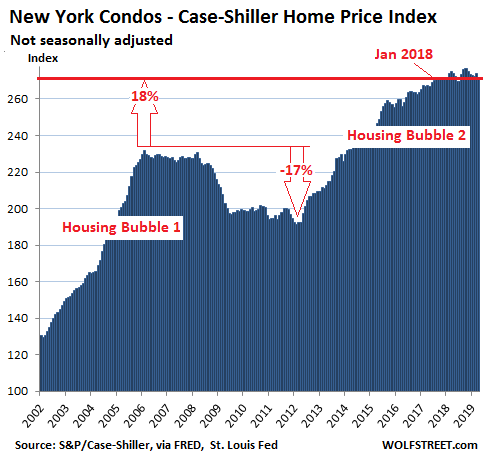
The Core-Logic Case-Shiller Home Price Index is a rolling three-month average; today’s release represents closings that were entered into public records in February, March, and April.
San Francisco Bay Area Condo Prices
Condo prices in the five-county San Francisco Bay Area – the counties of San Francisco, San Mateo (northern part of Silicon Valley), Alameda and Contra Costa (East Bay), and Marin (North Bay) – jumped 1.5% in April from March, according to the Case-Shiller index. But it wasn’t enough to beat the seasonal surge last year, and compared to April 2018, the index declined 0.7%. This was the second month in a row of year-over-year declines – the first such event since April 2012 at the end of Housing Bust 1:
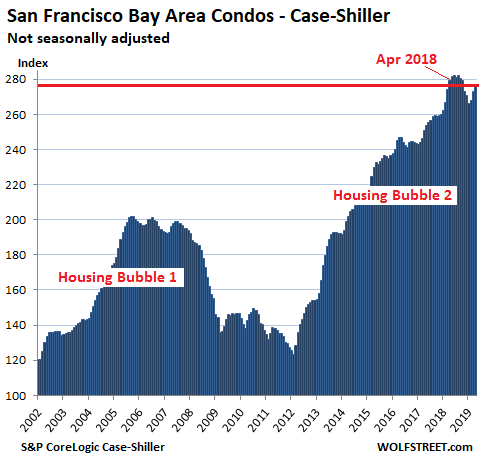
San Francisco Bay Area House Prices
The Case-Shiller index for single-family house prices in the five-county San Francisco Bay Area jumped 1.6% in April from March. But it wasn’t enough and further eroded the year-over-year price gains, which are now down to just 1.8% compared to April 2018. The index remains below its peak of July 2018:
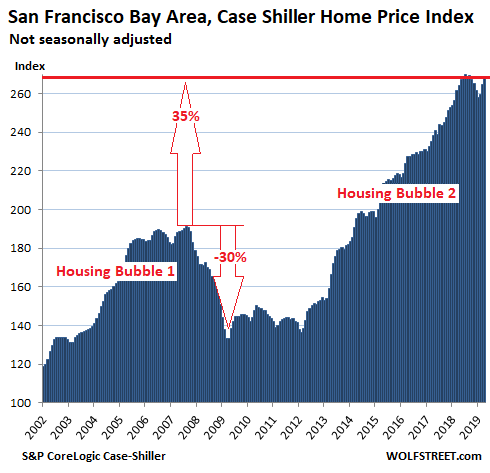
The Case Shiller index was set at 100 for January 2000; a value of 200 indicates that prices have doubled since January 2000. Every housing market on this list of the most splendid housing bubbles in America has an index value somewhere in its history of over 200, either during Housing Bubble 1 or during Housing Bubble 2, the minimum requirement for this list.
Seattle House Prices:
Prices of single-family houses in the Seattle metro rose 1.1% in April from March. But it wasn’t enough to keep up with the seasonal spring surge last year. This left the index flat with April 2018, the first year-over-year flat-reading since the end of Housing Bust 1 in April 2012. The index is down 2.8% from the peak in June 2018:
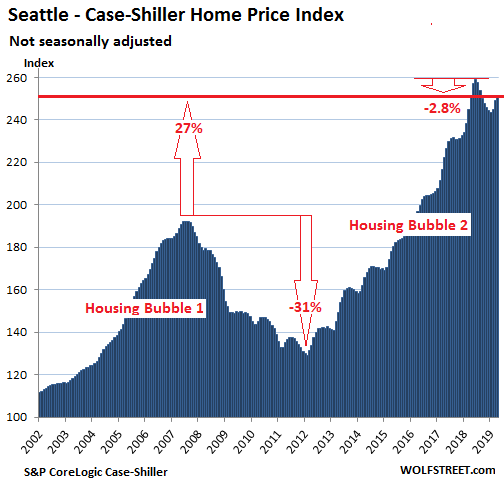
Los Angeles House Prices:
House prices in the Los Angeles metro rose 1.0% in April from March, thus beating by a tiny fraction the old record of August 2018, according to the Case-Shiller index. This moved the index up 1.5% from April 2018:
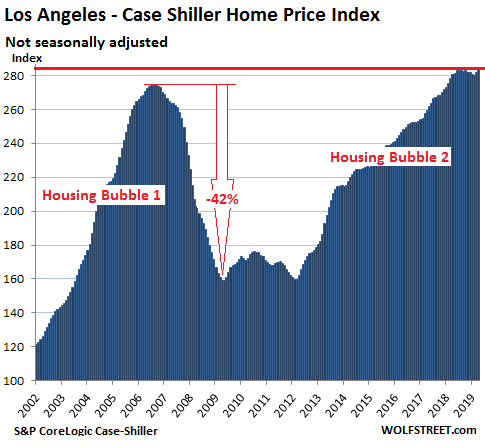
San Diego House Prices:
House prices in the San Diego metro ticked up 0.5% in April from March, less than the seasonal jump a year ago, which eroded the year-over-year gain further, now down to just 0.8% compared to April 2018. The index remained down a smidgen from its peak in July last year:
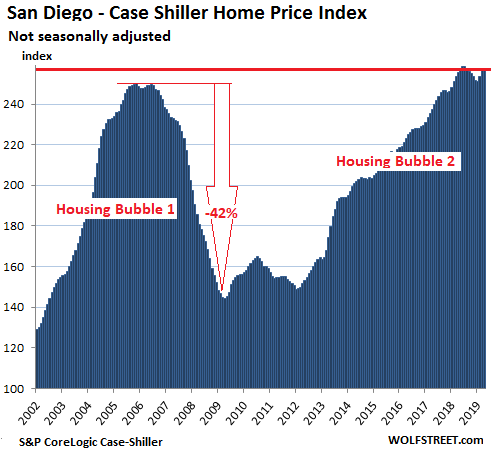
Portland House Prices:
The Case Shiller index for house prices in the Portland metro rose 1.1% in April from March, in line with the seasonal jump last year, leaving the year-over-year gain at 2.6%, but it allowed the index to barely squeak past its record of July 2018 to a new record by the thinnest of margins — and has the chart shows, has been essentially flat since July last year:
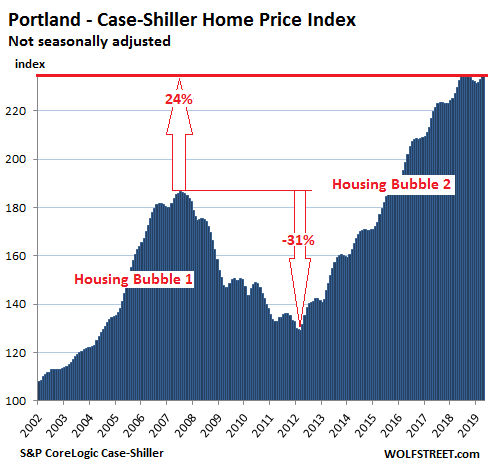
Boston House Prices:
After declining three months in a row from their November peak, house prices in the Boston metro started rising again in March, in line with seasonal moves. In April, the Case Shiller index jumped 1.9% from March to a new high, for a year-over-year gain of 3.9%:
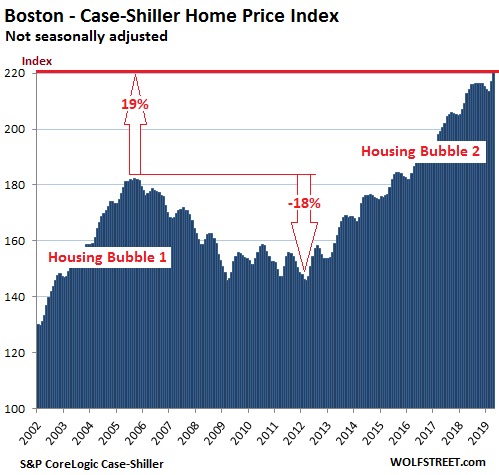
Denver House Prices:
House prices in the Denver metro rose 0.8% in April from March, but the seasonal gain was smaller than last year, and the year-over-year gain of the Case Shiller index was whittled down to 3.8%, the smallest gain since May 2012:
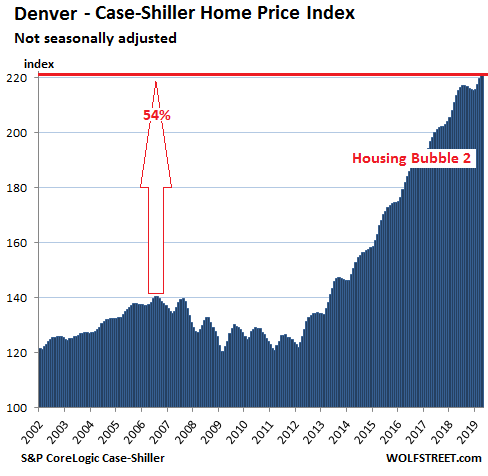
Miami House Prices:
House prices in the Miami metro in April ticked up a smidgen from March but remained a smidgen below February, creating a three-month flat spot that has now whittled the year-over-year gain down to 3.7%. This leaves the index 13.4% below the nutty peak of Housing Bubble 1:
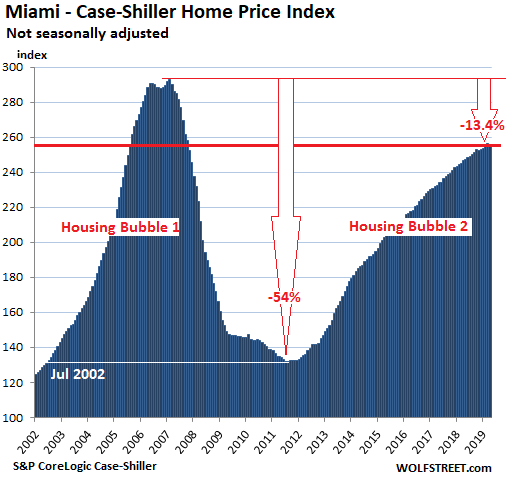
Tampa House Prices:
House prices in Tampa rose 0.7% in April from March and are up 5.6% year-over-year, but remain down 10% from their mind-bendingly nutty peak during Housing Bubble 1:
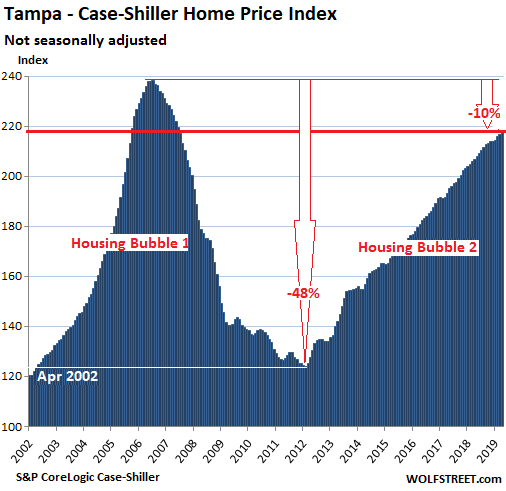
Phoenix House Prices:
The Case Shiller index for the Phoenix metro rose 0.8% in April from March, for a year-over-year again of 6.0%, leaving the index 17.7% from its crazy peak during Housing Bubble 1:
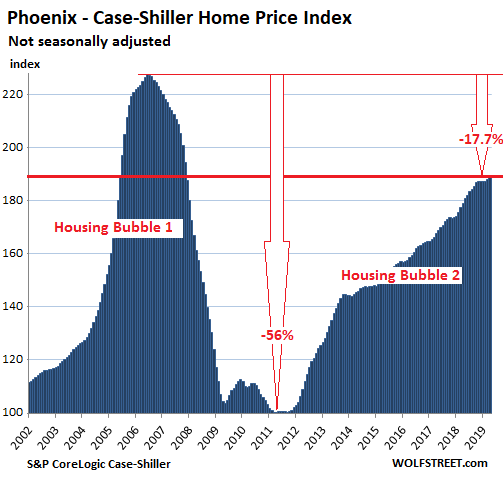
Las Vegas House Prices:
House prices in the Las Vegas metro rose 0.6% in April from March, for a 7.1% year-over-year gain, but that was down from February’s 9.7% and March’s 8.2% year-over-year gain. The index has been essentially flat since October last year:
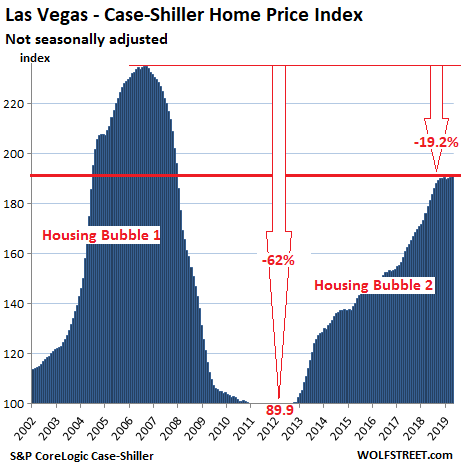
Washington DC:
The Case Shiller index for the Washington D.C. metro rose 0.9% in April from March, but this gain was less than the seasonal gain last year, and the year-over-year gain was whittled down to 2.6%. The index remains 9.6% below its nutty peak of Housing Bubble 1:
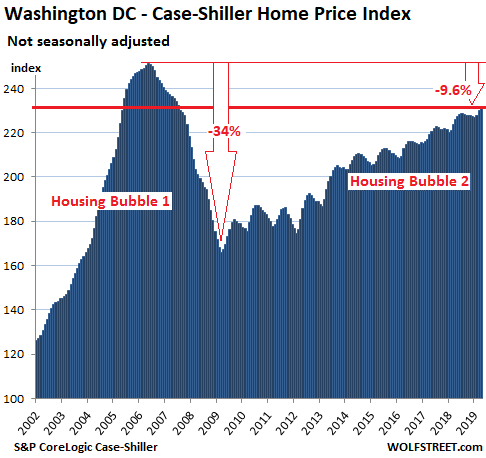
The Case Shiller Index, a measure of house price inflation
The Case-Shiller methodology is based on “sales pairs”: It compares the sales price of a house in the current month to the last transaction of the same house years ago, thus tracking price changes of the same house over time. When the price of a house doubles, it’s not because the house grew to be twice its former size, but because it takes twice as many dollars to buy the same house. So the index tracks the purchasing power of the dollar with regards to the same house, which makes it an effective measure of house-price inflation.
California labor force and employment drop as people and businesses bail out. Texans Say, “We’re Full.” And Californians, Buckling Under Housing Costs & Congestion, Tell Wannabe Leavers, “Just Do It.” Read... California Panics about Losing Businesses and People (to Texas): What the Housing Market Fears Most is Cropping Up in the Data
Enjoy reading WOLF STREET and want to support it? You can donate. I appreciate it immensely. Click on the mug to find out how:
![]()


I heard of “Price Reduced” signs in Menlo Park and Palo Alto. Don’t ever recall that happening.
Yup, reduced from Outrageously Overpriced to Ridiculously Overpriced.
+1000
Not in Palo Alto for sure. Around here it’s still “Open house on Sat/Sun, offer accepted next Wed”.
I watch Palo Alto very closely and the low end of Palo Alty is much much slower. I worry that the low end slowness spreads to the low end of SoCal beach cities. So far, the low end of SoCal beach cities is doing well … but, it is very possible the slowdown in Palo Alto is a red flag for SoCal beach cities. Keeping my fingers crossed.
What is slow end slowness? What are you hoping for in so cal?
Javier, I think the slow end slowness represents buyers with cold feet. They are all in the rental market and that is causing a squeeze in available rental housing. Many of them are scared to buy and are waiting for prices to fall. It is like a dam being built. If the dam breaks BEFORE a recession happens, then prices will march higher. It is possible the lower rates can cause the dam to break.
Socal is special and we can never have a downturn,The prices rose 100s of percent in last few years and if it goes down few percent then they are just noise..
these numbers are really insignificant.. few percent down after such a big run up in price is really not something to take a note..
Another Boomer hotbed, Orlando also saw its first YoY price decrease since the Great Recession.
The days of “normal” workers retiring to Florida after 20 years on, then collecting a pension for life are kinda over…
Once again, Los Angeles keeps it’s crown as the metro area with the greatest home price appreciation in the US … as measured by Core Logic. Los Angeles is north of 280, which is higher than any other metro. When you take in the fact that LA county has more than 10 million people, one can only imagine how high the number would be if you removed the distant desert areas from LA county. Those 2M+ Manhattan Beach tear downs were under 750K just 6 short years ago.
And, as I have been telling you for a while, Boston is hot hot hot. Finally Case Shiller is showing that.
With today’s low low mortgage rates, thing are going to get better from here.
Low rates today and things are going get better…….
30 year fix rate is higher than 2013.
Price is wayyyy higher than 2013.
Income better than 2013? I guess so, but NOT inflated as much as house prices.
Can house price rise even further? Sure. But this for sure is NOT 2013 any more.
Oh, please read the title. First y-o-y drop.
Yep Boston area is hot just like I’ve been seeing and saying for some time. Only seeing rising prices and bidding wars I’m my area and co workers.
I understand the charm for socal for weather and beaches.. but could never got the charm for boston… bad weather and big metro…I’d never want to live there.. guess quality of life sucks there
that too on top of all,, expensive housing.
In Boston, yes, and you must be rich to buy in Boston.
I sold my condo on the ocean coast in Quincy 3 yrs ago (borders Boston to the south), with panoramic views of the ocean and Hull and Hingham across they bay…because of rising sea levels. 1 year after I sold, it was placed into a flood zone by FEMA requiring flood insurance. At the lowest flood rating level to be sure, but it only gets worse over time and I could see it coming. And they are still putting up more and more condos in Quincy smack dab in flood zones, using up every open lot. And the prices of these flood zone homes is rising…maybe even faster than my new home hundreds of feet above sea level. I even saw pictures in the news of some of the new condos I used to drive by every day under several feet last winter’s storms.
Now I commute to work in a suburb south of Boston,16 miles through Easton and Mansfield, thru gorgeous 2 lane county like roads interspersed with beautifully landscaped middle income homes, minimal traffic…I’ve never had it so good.
But north suburbs of Boston are heavily congested I’ve heard and seen. Also friends reply when I ask them “how’s Quincy doing” the reply: CONGESTED.
Mortgage lending fraud will do that. The Case Shiller numbers are inversely correlated to the health of a given market. The bubble cities are a tinderbox ready to explode (implode?).
“hot hot hot” is not what I’m seeing in Boston. The city proper and surrounding high-end suburbs are doing okay, but I am seeing a lot of listings in Newton, Lexington, Brookline, Natick, etc… sit on the market, have price cuts, and sell slightly below asking. The only properties that I actually see these bidding wars on (like you and Timbers are pointing to) are the ones that are intentionally priced significantly below market to generate competition. The actual ending bid is usually just about at market price, if not still slightly below. The days of a $500k house going for $575k after a bidding war, with waived contingencies are definitely over.
In the further out suburbs? Dead. Burlington, Billerica, Westborough, etc… are multiple price cuts, sales below asking. I went to a few open houses this past weekend for fun in the $500-$700k range. Very few names on the sign-in sheets.
Boston seems to be holding out better than some others for now, but I think it’s only bolstered by low mortgage rates. Rates are nearly 100bp lower than this time last year, yet foot traffic seems to be slower. Even Zillow and Redfin are saying some of the hot areas (like Newton, Brookline) are expected to decrease (albeit a modest amount) over the next year.
I know a few in Boston that are trying to get into a decent home in the metro West. They have lost out in a few bidding wars and and are becoming discouraged. They are waiving inspections but they can’t afford to wave financing contingency, so they keep losing. In Boston, to win a bidding war, you almost need to wave the finance contingency. I tell them not to do that and wait till the market cools.
Another thing I see in Boston is a new trend where massive homes are considered “uncool” … they are considered bad for the climate. I know of a home in Weston that is nearly 7000 sq ft that was built in the late 60s. They bought it in 2015 and will be losing money on it. Many Democrats refuse to live in a home that wastes so much energy and Boston is full of Democrats. This trend is definitively something to watch.
I disagree with your Boston assessment. Most homes sitting the market are either defective or massively overpriced. Anything decent goes very quickly. The Boston market is doing so much better than California coastal markets. On the eastside of Costa Mesa, I see a decent deal on a 1.3M fixer that is sitting … have not seen that in years. Such a deal would never sit in Boston.
No kidding. But You don’t have to be a Democrat to not want to buy a gargantuan structure.
Who but a king or a masochist would want to live in a 7000 sq ft compound unless it were empty? :).
The effort to clean and the winter heating bills alone would keep me up at night. Do you page people to find where they are and ride a scooter to get around faster?
I struggle with keeping a small space tidy and have noticed that people use far less space than they think they will in large homes (ie the formal living room).
Maybe the massive houses will be converted to communes. :). Or condos. Lots of condo-styles houses chopped up in Boston already.
Here are a few comments from the boston globe from today discussing the May housing market:
Headline:
Mass. housing market broke records in May
First few sentences:
The region’s housing market continued to roar along during the spring, with home prices hitting record highs in May.
A pair of reports released Wednesday detailed sharp gains in prices of both single-family homes and condominiums in Massachusetts for the month, with sales volume also climbing as the market rounded into what is typically its busiest stretch of the year.
These comments support what I am seeing in Boston.
It does seem like the market is slowing in the Boston area. Lots of price reductions compared to last year at this time. In my Cambridge neighborhood on a very desirable leafy street near Harvard, a 600 sq ft condo listed for 695K on 5/21/19 is now reduced to 599K.
A friend’s condo in Brookline, top floor 2BR, 2bath elevator building in a desirable area just sold. It sat for 5 months, with the final price reduced by 130K.
No wonder since it appears that prices have doubled in many cases since 2012-2013.
SocalJim – Socal beach towns are are already down big time. The high end is down over 20% already.
Boston is not immune from the high end glut that is bringing down California and NYC.
Most of these house price charts (especially the West Coast Ones) look like an endurance athlete that has been juiced with steroids and adrenaline. Their performance keeps climbing as the doses increase little by little over time. Then they hit the peak of what their body can take and they jitter up and down at a kind of performance plateau until their heart gives out and they slump in to a coma or death. We are right now at the performance plateau part of the curve with housing prices.
With So many fake news articles it’s really hard to believe anything anymore. I’ve been saying the markets should be tanking for 2 years now and it keeps on trucking along.
I read an article about 50 million homes in China are unoccupied and are bought up as investment properties. How can so many homes be empty and yet the market not be a buyers market hot and also bring prices down.
The other thing I always wondered is everyone’s screaming about a housing availability crisis in the Silicon Valley. Yet more people are leaving here because it’s an affordability crisis lmao.
The other thing I always think about is who is estimating the the amount of people moving to the Silicon Valley to justify all of the apartments being built. Where are all these people now living in there car waiting for an apartment to be built for them lol
There are a lot of now leasing signs everywhere I drive and the Chinese have slowdown buying and everyone’s getting gentrified down SF. Talk about a total disaster.
Let’s talk about vacant commercial buildings now that’s even worse I’ve been to many vacant buildings to do HVAC work and yet we are building more buildings because the HVAC is old and to costly to updated however even new buildings just sit there waiting to be leased.
These are very interesting times and if the prices don’t go down I’ll move out simple is that.
Jim – I agree that the MSM can be misleading, but what is it about the market right now that leads you to believe it will crash? The economy is red hot and unemployment is at record lows. Virtually everyone has a job, and many people have done insanely well over the past 10 years. There are record levels of cash sloshing around the system and the Fed has indicated it will CUT interest rates if necessary?
There seems to be a glut of high end housing because the combination of the tax reform act and clamping down on foreign buyers has hit demand. Other than that, the low end is performing very well as would be expected.
I’m also getting the sense that many people big city residents are cashing out and moving to cheaper 2nd tier markets. All big cities appear to be at least somewhat overvalued, but many 2nd and 3rd tier cities still have some room to run.
Your metaphor is absolutely correct, except these days “performance enhancing” is far harder to catch than it once was, subtler (no people dropping dead in the middle of the field due to substance abuse) and more expensive. Far more expensive.
Take this as a continuation of your metaphor: these days only those who cannot afford all the bells and whistles or are desperate enough to gamble away their careers get caught by tests. But when you have a 38 year old regularly beating a 25 year old professional athlete, something’s not right. And when you have a whole field of 40+ year old “athletes” instead of strapping young lads, a scandal is sure to break out.
And it usually does.
Two things may then happen: either the scandal starts swallowing up people left right and center or it gets hushed up quickly by blaming a single “rotten apple”. It’s usually the latter.
However if the “rotten apple” has no intention of being the only scapegoat he may start naming names and pointing fingers, quickly turning the scandal in a nightmare scenario.
Your comment is interesting and I’ve been asking myself the same question for years.
A few years ago I was telling my professional partners that Armstrong was clearly on the dope, but they were buying yellow wrist bands.
Then he was caught and they didn’t care.
We all know that EVERYBODY is tennis, baseball, football, basketball etc is on the juice.
And EVERYBODY in the business knows.
And nobody gives a shit.
I arrived in Florida in 2012. There seemed to be “For Sale” signs on every block. A Cape Coral condo was sold in a short sale for $50k.
They said wealthy Latin Americans invested in Miami ocean view property. There may have been money laundering. The place as a Cuban American influence. The median income family has difficulties buying property there. Recently there was an article about wealthy Brazilians skipping Miami to buy properties in Portugal.
I read about wealthy Chinese driving up the cost of real estate in Australia, Hong Kong, Vancouver, Toronto and the West Coast USA.
I know a couple, in south FL, who only recently managed to unload the two condos they owned when they married 10 years ago. The losses were $30K and $50K. It took them 10 years to save enough to get a bigger place and 10 years to build enough equity to get out. The place they bought over a year ago was sold to them by a guy who took a $150K loss to unload his place.
The GFC is still playing out in the places that took the biggest hits, but you only hear about it, if you know the victims.
Just like for Canadian cities the US housing market is flat, it’s no going up in any appreciable way nor is it going down, for the most part. For example, for LA the index went up a measily 1.8%. That is not an expansion of the house bubble in this city. Looking at these charts for the last few years that is a marked slowdown. But don’t worry housing bulls, Powell will drive interest rates down to zero.
Mortgage rates are just now starting to fall in Canada. Unlike America mortgage rates didn’t fall until now. Prices will shoot up in the greater Toronto area and continue to fall in the Vancouver area.
DC doesn’t look like it is in really in bubble territory, the prices there are still 10% lower than were they were over a decade ago in 2006 and that graph shows a slow/steady increase versus the wild and steep increases indicative of a bubble and seen in the other city graphs.
Most of those graphs show smart upturns in home prices around the time Powell did his not U-turn, U-turn. Some of them even look like U-turns. If you flood assets with liquidity, you’re gonna get asset bubbles. And Powell has done just that.
Seasonal: Spring selling season. Most of the upticks this spring were smaller than last year, as explained in the article.
So do you think Boston is in a bubble, or is where you live the magical exception to the rule?
sc7 – Everyone loves expensive housing, high taxes, terrible weather, and horrendous commutes. Boston is definitely the one expensive coastal city that will not catch the flu.
Vancouver BC RE sales are down over 30% +. Pre-purchased condos are being walked away from by buyers, and projects delayed. People have pre-purchased only to discover they won’t be built any time soon. They have no recourse for the delays and are now underwater before shovels even hit the ground.
Greed and/or herd mentality is a bit$h.
https://globalnews.ca/news/5418388/as-sales-stall-metro-vancouver-caught-between-a-buyers-and-sellers-market/
I wonder Don will “convince” the “independent” Fed that money should be nearly free again so as to have another four years to make ‘Merica great (again) giving a kick to real estate prices (again.)
Now add in drastically dropping sales and a massive inventory build…
“Sales of new single‐family houses in May 2019 were at a seasonally adjusted annual rate of 626,000, according to estimates released jointly today by the U.S. Census Bureau and the Department of Housing and Urban Development. This is 7.8 percent below the revised April rate of 679,000 and is 3.7 percent below the May 2018 estimate of 650,000.”
https://moneymaven.io/mishtalk/economics/new-home-sales-plunge-35-9-in-the-west-7-8-overall-prices-down-8-1-YXy04c-77kmrvvphEehjrw/
Went to a few open houses in the Boston area this past weekend for fun. Natick, Waltham, Newton. This time last year, there would be pages of sign-in sheets filled in, lines of cars down the street. Now? The most I saw in the last half hour of the OH was 7 names on the sheet. Parked right in front of each of the 4 houses I saw, only at one house was someone else in there at the same time as me.
I remember looking at properties out in Billerica, a much less desirable town, last year. One had 11 cars parked out front, you could barely walk in the tiny cape house, over 30 names signed. It sold for $45k over asking. That just isn’t happening this year, not even in the “hot” suburbs. Pricing is sticky, but I’m watching Boston get ready to fall off the plateau.
sc7 – It makes sense. Who is buying at these valuations? Owning a home sucks unless there is a massive financial incentive to do so. If price gains are slowing and inventory is building across the board whats the point of owning? Do people actually enjoy cutting grass and fixing toilets? Not me, sold our house last year. Never buying again unless there is another fire sale.
Excuse me Ed but you haven’t heard about “pride of ownership”? Maintaining a nicely mowed green lawn is a mark of success! ;-)
As a long term renter and MA native, I have felt the pressure to “own” throughout my adult life. If you don’t keep up by owning, decorating and maintaining a beautiful home, you potentially face the condescension and one-upsmanship from those who do. It never seems to end.
A female friend who rented apartments for 30 years bought a house on the North Shore with her man friend a few years ago. She immediately, like so many other home “owners” I know, dropped comments like “well, when are YOU going to buy, what are you waiting for?”
Two stress-filled years later, she confessed to me that she missed her single apartment life, that I was missing nothing and that the reason people are pressured to buy homes is “misery loves company”.
But,… but ,..but,… wait. I am supposed to get a great return on my new HELOC secured investments!! OMG, what position does my HELOC security have in vanishing real estate equity?
Yours truly,
The Greater Fool.
Boston is still eeking out gains but IMO is not going to end well. 2-3% per year is the way to a stable way to build wealth from a primary residence. Boom and busts are horrible for communities for reasons that extend way beyond $.
Similiar characterisitcs to the 08-09 run ups. The loans are better since it eas FHA that carried the mortgage market but again with 3.5% downpaymwnt and high ratios. We increased rates and financial markets were flying just like they are now and than it tanked. We will see it again it’s around the corner.
So a recent study on tech salaries shows the *slowest* wage growth to be…in the Bay Area/SF.
With tech salaries so stagnant there, it’s only a matter of time. I’ve been saying this for some time. With salaries so much higher in the Bay Area and remote work possible, how can the Bay Area command a premium anymore?
And that’s exactly what we are seeing. The jobs are moving out, pushing salaries up in other metro areas, while the Bay Area is flat. This trend is going to continue, but when the salaries in other areas are almost the same, there won’t be an incentive for people to move there, which is going to impact housing prices.
Just my opinion. Sadly, I sold my house 4 years ago…and missed some of the run up. I’m a native and would like to move back someday (I’m in Seattle). I think eventually this will normalize.
Bay Area is absolutely horrible place to raise a family unless you are loaded.
There are much better alternatives.